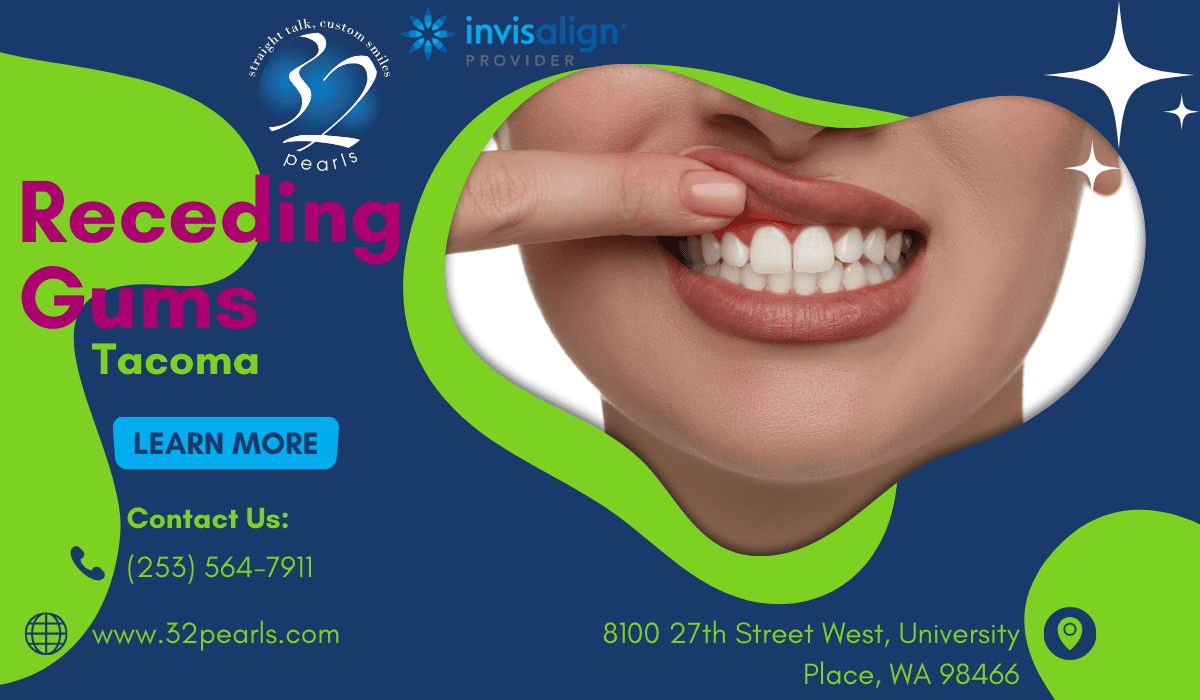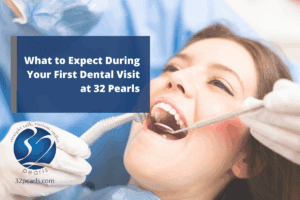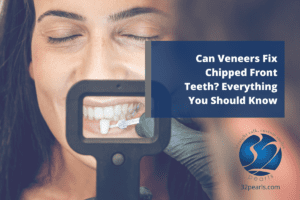
Transform your smile at 32 Pearls – Your destination for comprehensive dental care. Unleash the radiance of healthy teeth with our expert team. From routine check-ups to advanced cosmetic dentistry, discover the art and science of a vibrant, confident smile.
Have you ever taken a sip of something hot, and a jarring explosion shoot through your teeth? Nothing is worse than jolting pain in your gums while brushing. Do you brush and floss regularly but still have painful sensitivity in your teeth and gums? There are several reasons for these symptoms. Two hundred thousand people in the U.S. have exposed tooth roots due to receding gums. If you feel like jumping out of a window every time you brush your teeth, we can help.
At 32 Pearls, we understand the causes of receding gums and have solutions that reduce painful swelling, reddening, or sensitivity around those areas. In most cases, gingivitis is the leading cause of receding gums, but there are other reasons. You can not reverse receding gums. However, adjusting how you brush and floss can help reduce the sensitivity. We can do several things to help with th
Reasons for Receding Gums
The proper term for gums is gingiva. The gingiva’s function is to protect the nerves with connective tissue below the surface of the teeth. Sometimes, the layer of gingiva wears down and exposes the tooth’s nerves. If not cleaned properly, bacteria stick to open areas, eventually breaking down the tooth. Removal of bacteria is critical to diminish the onset of an infection. If the area stays clean and healthy, the gums remain intact, and there is a better chance of saving the teeth.
- Gingivitis and periodontitis are common reasons for receding gums. 32 Pearls offer a wide range of restorative services to help with gingivitis and periodontitis. Check our service page and sitemap for more information.
- Brushing too hard. Gums are too soft to withstand years of brushing with hard bristles. Often, people brush or floss too hard in an attempt to do a better job cleaning their teeth. Unfortunately, they end up tearing apart their gums. Simple changes in behavior can regulate the effects of brushing too hard. Most likely, you need to relax and slow down. Get yourself a brush with soft bristles and brush softly in circular motions.
- Bruxism and teeth grinding are huge contributors to receding gums. The constant movement weighs heavy on gums and opens the pockets surrounding teeth. Bacteria easily fall into those pockets. Mouth guards are helpful and effective for treating bruxism.
- Dehydration causes dry mouth, which can be a factor in gum recession. Many prescription medications, caffeine, smoking, and an acidic diet can reduce saliva. Food particles do not wash away easily if there is a lack of saliva in the mouth. Drinking more water increases hydration and assists with the breakdown of food.
- Genetics is also a reason for thinner gums. Some people have a smaller layer of protective gum lining that recedes regardless of dental habits.
- The enamel in your mouth is a very strong substance. It’s the strongest material in the entire body and can withstand various foods, stains, chemicals, and harsh variants. Acids can reduce enamel and irritate the gum line over time. If you take care of your mouth, you can avoid a serious breakdown.
Signs and Symptoms of Receding Gums
Long teeth occur when gums get shorter and more of the tooth is exposed. Usually, only the top part of the teeth is visible. As gums wear away, the teeth look longer because the lower half is in view.
Teeth loosen when gums recede because teeth need gums to stay in place. Gums keep the teeth from moving; if the gums are not there, the teeth will get loose and eventually fall out. If you are only experiencing sharp pain in the gums when brushing, you are not at this stage.
Teeth sensitivity is the most prominent symptom when you get uncomfortable nerve pain while brushing. The tooth has become exposed and hurts with the onset of hot and cold fluids or anything else that touches the area.
The best thing to do is check in with us and get regularly scheduled checkups to manage painful and sensitive gums.
Treatment for Receding Gums
Make sure you see us first for recommendations.
The best way to treat receding gums is to get a softer bristle, lighten up on brushing, and try toothpaste for sensitivity. Adjusting flossing habits is a good way to help stop gum recession. We want to take a look to make sure there isn’t any inflammation or decay. Professional cleaning is very effective.
Deeper dental cleaning is available to help remove tartar buildup that pushes down on the gums. Dentists are highly skilled and have the tools to clean the areas that are hard to reach with just a toothbrush and floss. 32 Pearls uses the highest quality tools and equipment developed to reach and remove bacteria deep within gum pockets. The only way to remove the harmful bacteria is to go to 32 Pearls and have it cleaned out.
Scaling and root planing is the procedure dentists use to remove hard plaque and tartar. After cleaning the area, they smooth the tooth, making it harder for new bacteria to attach.
For extreme gum recession or tooth loss, traditional surgery known as a Gingival Graft removes tissue from the roof of the mouth and uses it to cover the exposed root and receding gums. Stitches hold the new tissue until it grows over the gums and heals.
For milder cases of gum recession, and if the patient doesn’t have periodontal disease, a Pinhole surgical procedure is a technique that your dentist could recommend. The procedure includes creating a pinhole in the receding gum. The gums are stretched and lifted over the exposed area, then set in place with collagen strips.
We help with receding gums.
32 Pearls are Tacoma’s leading experts in oral hygiene and gum care. If you are experiencing pain and sensitivity in your gums, let us take a look. We will get you the relief you need and help you to take control of your dental well-being. Call today to schedule an appointment. (253) 564-7911





